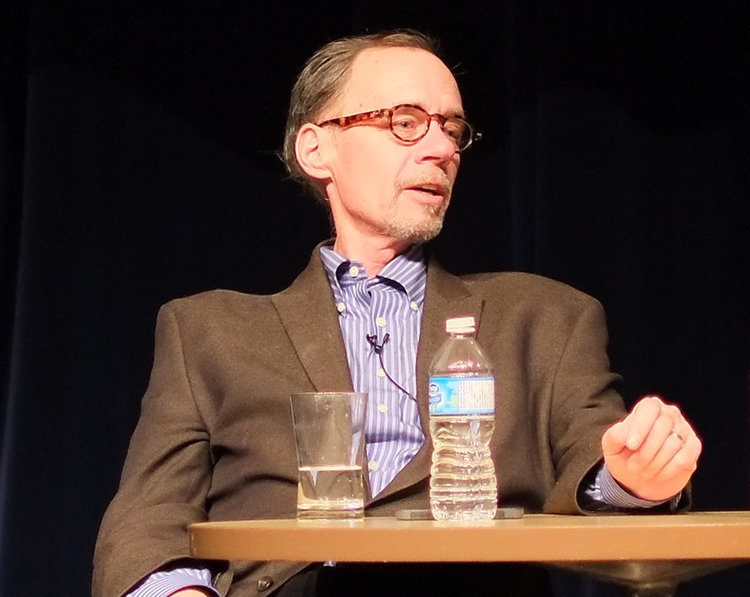For journalist David Carr’s legion of fans (Press reporters among them), Mondays will never be the same.
Carr, the revered media columnist for The New York Times whose must-read weekly column in the paper’s business section each Monday served as a critique of the industry he loved, died unexpectedly Thursday. He was 58.
Carr reportedly collapsed in the Times newsroom, according to the Times. He was pronounced dead at St. Luke’s-Roosevelt Hospital, the paper reported. Carr had hosted a much-anticipated “Times Talk” earlier in the evening with documentary filmmaker Laura Poitras, journalist Glenn Greenwald and NSA whistleblower Edward Snowden.
David Carr was a great journalist & a great person. He introduced us to his daughter after the event, who he was always praising. So sad-RIP
— Glenn Greenwald (@ggreenwald) February 13, 2015
In that hour we spent w/him, David Carr showed all the traits that made him beloved: idiosyncratic, hilarious, so authentic & deeply human.
— Glenn Greenwald (@ggreenwald) February 13, 2015
Carr, an incredibly talented writer, had a knack for measured—and sometimes searing—critiques of the industry in his weekly column, “Media Equation.” He was also one of journalism’s fiercest defenders. In a world filled with instant outrage, Carr was a calming influence. Carr’s column was considered required reading for everyone from media moguls and Hollywood executives to little-known journalists, politicians and regular readers drawn to his intellect and beautiful prose.
Upon learning of his death, journalists took to Twitter to espouse widespread praise about Carr’s work and his life.
Brian Stelter, who worked with Carr at the Times before becoming CNN’s senior media correspondent and host of the Sunday morning media show “Reliable Sources,” said he viewed Carr as a father figure.
My heart is broken.
— Brian Stelter (@brianstelter) February 13, 2015
I loved David so much. He’s been the closest thing I had to a dad. About girls, bosses, life — he always knew what to say, what to do.
— Brian Stelter (@brianstelter) February 13, 2015
We all looked to @carr2n to make sense of the media revolution & to contemplate the future. A future without him is terrible to contemplate.
— Brian Stelter (@brianstelter) February 13, 2015
Carr was born in Minnesota. Before rising to prominence at the Times, Carr worked at two alternative weeklies, Twin Cities Reader and Washington City Paper.
When it came to his reporting, nobody was off limits, including Carr himself. In his brutally honest memoir “The Night of the Gun,” Carr wrote about his battle with drug addiction. He was also a cancer survivor.
Carr’s career at the Times began in 2002. His star grew brighter in 2011 when the Times documentary “Page One” was released.
“He was our biggest champion,” Baquet said in his memo to staffers, “and his unending passion for journalism and for the truth will be missed by his family at The Times, by his readers around the world, and by people who love journalism.”
Journalists React to Carr’s Death:
There’s so much to say about the life and career of David Carr. Here’s a start: http://t.co/uVobSZjUaq pic.twitter.com/hYByyHUbcT
— The New York Times (@nytimes) February 13, 2015
There was no one whose criticism of my work I trusted more than @carr2n, and no one whose praise meant more to me.
— a. o. scott (@aoscott) February 13, 2015
A world without David Carr is a worse world.
— Jake Tapper (@jaketapper) February 13, 2015
“I think working in journalism beats having a real job” — David Carr #RIPDavidCarr @nytimes
— Sarah Walters (@SWaltersTV) February 13, 2015
David Carr vs Vice: The video that shows why Carr was such a force in journalism http://t.co/HMgTVaedjD via @Max_Fisher
— Max Fisher (@Max_Fisher) February 13, 2015
If only more journalists were as honest about their craft, and themselves, as David Carr…RIP, maestro.
— Jose Antonio Vargas (@joseiswriting) February 13, 2015
David Carr was the journalist every reporter wants to be when they grow up. And rightfully so. RIP
— Wesley Lowery (@WesleyLowery) February 13, 2015



































